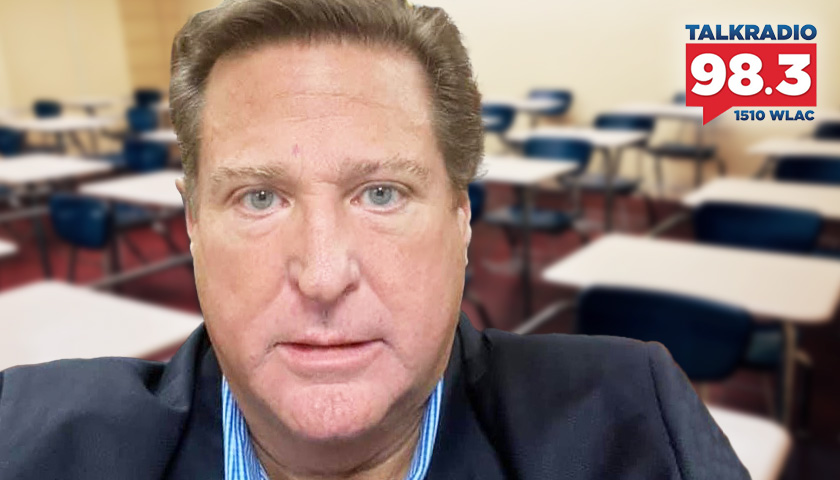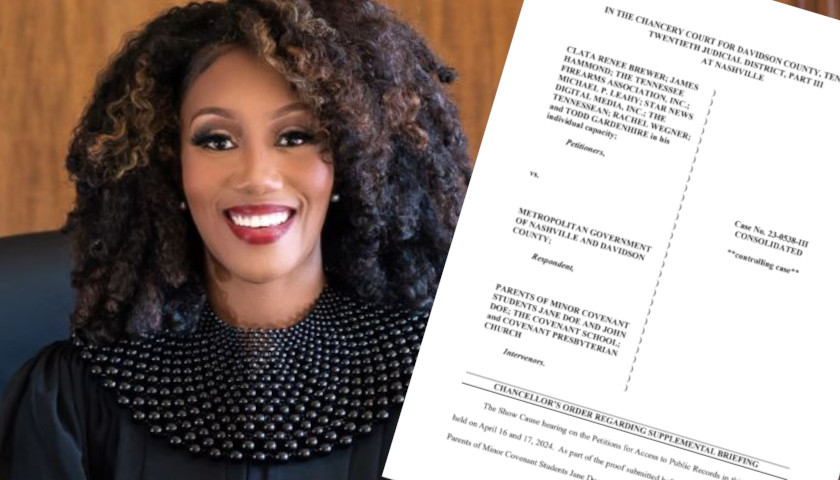Live from Music Row Friday morning on The Tennessee Star Report with Michael Patrick Leahy – broadcast on Nashville’s Talk Radio 98.3 and 1510 WLAC weekdays from 5:00 a.m. to 8:00 a.m. – host Leahy welcomed Professional Educators of Tennessee Executive Director and CEO J.C. Bowman in studio to discuss the factors that pertain to a successful public school system and national educational reports.
Leahy: In studio, right now, our very good friend J.C. Bowman, the president of Professional Educators of Tennessee. Good morning, J.C.
Bowman: Hey, good morning, Michael. Good to see you this morning.
Leahy: Well, you know, there’s a lot of darkness and evil out there, and we need you to bring sunshine and light. But I’m going to tell you something here.
It doesn’t sound exactly like sunshine and light in the world of K12 public education, there’s a group called the National Association of Educational Progress, NAEP since 1990 or actually since way back in the 1970s, they’ve been putting out annual reports about the long term trends in reading and mathematics assessment for age nine students.
Bowman: Yeah, we’ve addressed that. You and I have talked about this before because we did it in the Star. And one of the things, you know, we talked about was when we were all praising it and thought it was doing great, I came out and go, yeah, I don’t read too much into the results.
There are many factors that contribute to high-quality public school system performance, funding, safety, class size, quality of educators, community support, just to name a few. Just one snapshot. I hate to say it’s not a big deal. It is a big deal to some people.
Leahy: Well, that’s called the National Report Card. And the results that just came in are very bad. For reading the score has dropped by five points for the average nine-year-old from 220 to 215.
That’s the largest score drop in reading since 1990. In mathematics, the score dropped seven points from 241 to 234, the first-ever score drop in mathematics. And the Biden maladministration, you want to know who they’re blaming for this?
Bowman: It’s got to be Trump or Reagan.
Leahy: Donald Trump!
Bowman: We couldn’t get Reagan in there.
Leahy: They might, I don’t know, but they’re going after Donald Trump. This guy the Secretary of Education. This political hack, Miguel Cardona is basically saying it’s all Trump’s fault.
Now remember, Trump was president for 10 months of the pandemic. Twenty months of the pandemic that Joe Biden has been president, apparently nothing happened in the 20 months of Joe Biden.
Bowman: Yeah, let me answer one quick thing. First off, the drops since 1990, as you referenced it, it marks a sharp drop since 2020. That’s the other year. But it was seven points higher than it was.
But still, the scores that were done even after the Pandemic were seven points higher than it was in 1971, and the average map scores were 15 points higher than it was in 1978.
Leahy: I wouldn’t exactly call that progress, though, because overall the scores are pretty darn low.
Bowman: But here you go, Michael. Here’s the beauty in this whole thing. This is a sample size. So if I want scores to go high, I’ll go over the Williamson County test if I wanted to go low. Now, supposedly the sample size is all mixed up and by the way, it includes private school.
So it’s every school they do a sample size, what does your state look like, supposedly? And they get a sample and it’s about 3000 kids that take this test in each state.
Leahy: So let’s talk about the general situation of education. Just for our listeners, because some people don’t understand exactly what you do at Professional Educators of Tennessee.
You’re not the teacher’s union, you’re exactly the opposite of the teachers union. And you’re on the web at proedtn.org. But tell everybody listening audience, what Professional Educators of Tennessee is.
Bowman: Well, we’re in a teacher’s association and in that we do advocacy. We go out here and we speak about education issues and we talk about key things to try to explain from a different perspective a lot of people try to consider as an alternative to the union.
And at this point I don’t see that we started out in that realm, but we’ve moved further. We offer teacher member benefits, liability protection.
Leahy: Liability protection is big, I think.
Bowman: Oh, it’s huge right now, the whole thing. We try to do things to make sure that we’re protecting our teachers and students. I mean, in every regard, we try to strike a healthy balance and we want to work with local school districts.
And what we’re seeing is a usurpation of the power that goes to the state. The states reach down and taking a lot of things in local control away from we used to all use the mantra we’re for local control of education.
Leahy: So here in Tennessee, the state education department is usurping the powers of local districts.
Bowman: Absolutely. And you and I talked about this, I think last year we talked about when TISA was a big deal. Tell people what TISA is.
Bowman: It’s the Tennessee Investment and Students Act.
Leahy: And what does that do?
Bowman: And that’s going to be the new funding formula that we use in Tennessee.
Leahy: Has anybody figured it out yet?
Bowman: Yeah, we know it’s going to raise taxes. And I think the Tennessee Conservative News or whatever came out, and I think you guys did a pretty good analysis of it from John Cypher and talked about how we’re not growing as much in spending in that area, but that’s neither here nor there.
What is happening is that we know that money is going to go up because every time you raise money at the state, you have to put more money in at the local and then everybody than I do.
Leahy: So let’s talk about the abysmal state of K-12 public education here in America and in Tennessee right now. This is me talking, right? So you look at this and you see reading and writing scores declining.
You see the rise of all of this propaganda out there delivered through many teachers and through the educates that kind of run the school systems that they’re pushing transgenderism. They’re pushing critical race theory.
They’re not supposed to be pushing critical race theory, but they are. There’s a law here that says don’t do it. But if you look at the subtle influences of, (Whispers) ‘social emotional learning’, they’re pushing democrat, progressive, anti American thoughts and ideas into all of our K-12 public school students.
This is a very concerning situation. And let me just add one of the things about teachers out there. I think it’s very difficult being a teacher today.
I think they get all sorts of disrespect at every level. And in Tennessee, I mean, I’ve looked at the numbers. The average public school teacher is paid like, what, $51,000 a year or something like that? Maybe lower than that.
Bowman: It’s lower. You’re doing average when you’re adding the central office staff.
Leahy: Tennessee public school teachers get paid far less than other public school teachers in, say, New York or Texas or California.
And so you add that along with all of the stress that these teachers have from parents who are upset and all of the requirements imposed on them by the educrats running the school, it’s a tough job.
Asterisk and this is kind of my perception of it. A number of teachers in this tough job, I would say to me, it seems like the vast majority of them are far left progressives who are pushing all of this woke junk on their kids.
This is my perception of it. The teachers that are just trying to teach are having additional burdens imposed upon them because they’re pushing against this woke ideology that’s everywhere. You’re kind of shaking your head.
Listen to the interview:
– – –
Tune in weekdays from 5:00 – 8:00 a.m. to The Tennessee Star Report with Michael Patrick Leahy on Talk Radio 98.3 FM WLAC 1510. Listen online at iHeart Radio.








